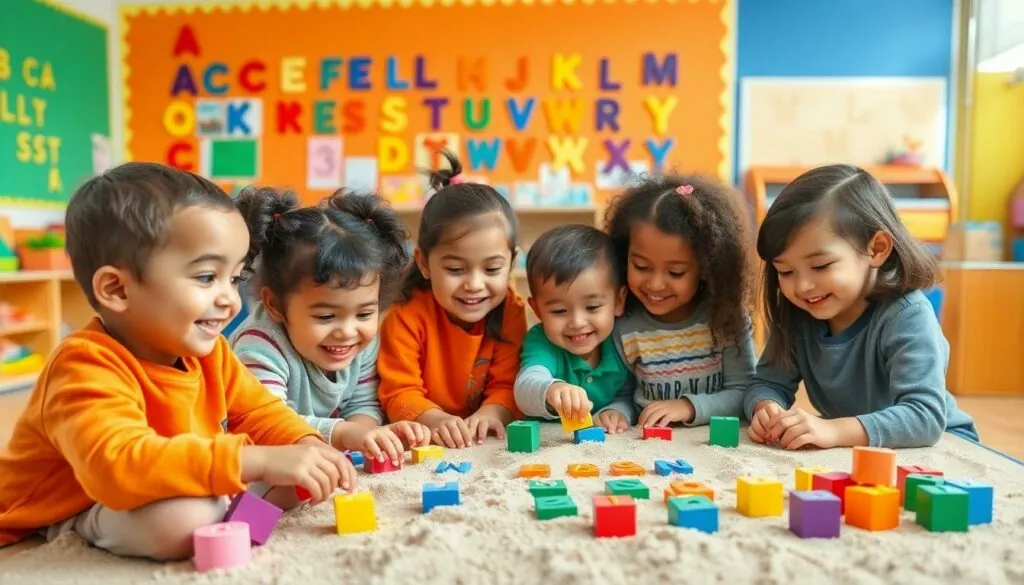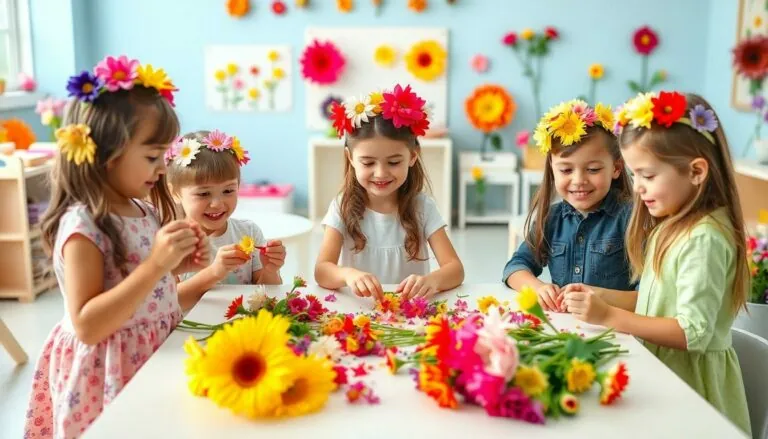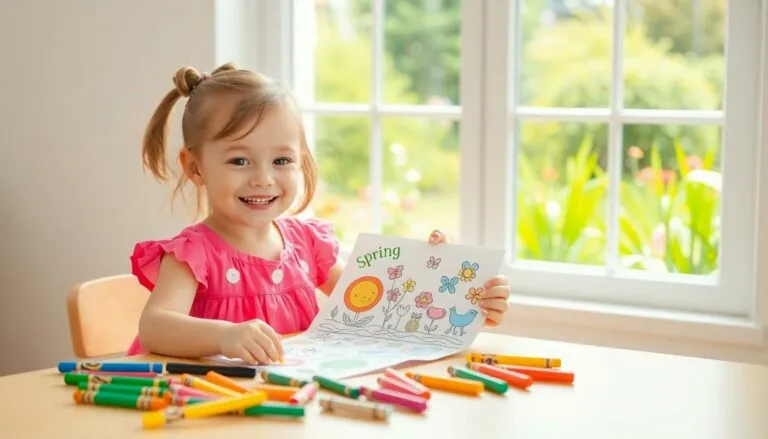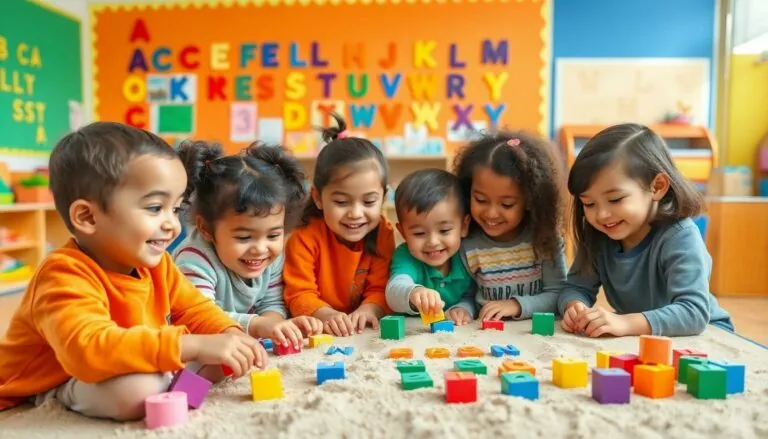Table of Contents
ToggleTeaching preschoolers to recognize letters can feel like herding cats—adorable but chaotic. Yet, it’s a crucial step in their journey toward reading. With the right activities, kids can learn while having a blast, turning what could be a mundane task into an exciting adventure.
Imagine a world where letters come alive, dancing off the page and into the hearts of little learners. From playful games to hands-on crafts, there’s no shortage of fun ways to engage young minds. These activities not only boost letter recognition but also spark creativity and joy. So buckle up and get ready to explore a treasure trove of letter recognition activities that’ll have your preschoolers shouting “A is for Awesome!” in no time.
Importance Of Letter Recognition
Letter recognition serves as a crucial building block for preschoolers’ literacy development. Understanding letters allows children to decode words, leading to reading fluency. Engaging in letter recognition activities lays the groundwork for future reading skills.
Cognitive development occurs through activities that promote letter recognition. For example, recognizing letters enhances memory and improves attention spans. The ability to identify letters correlates closely with reading comprehension in later years.
Social interactions also gain from letter recognition. Playing games that focus on letters encourages teamwork and communication among peers. These activities create an environment where learning feels social and enjoyable.
Fine motor skills improve alongside letter recognition efforts. Activities that involve writing or tracing letters help develop hand-eye coordination. Such skills are instrumental in preparing preschoolers for writing tasks.
Academic success often stems from early literacy skills. Children who recognize letters early are likely to excel in reading and writing as they grow. This foundational skill often predicts overall school achievement in critical areas.
Incorporating letter recognition in everyday activities reinforces learning. Recognizing letters in signs, books, or games integrates literacy into daily life. This practical approach strengthens a child’s learning experience.
Ultimately, focusing on letter recognition nurtures a love for reading. Early experiences with letters can spark an interest in books and storytelling. Fostering this enthusiasm plays a significant role in a child’s educational journey.
Fun Letter Recognition Activities
Engaging preschoolers in letter recognition is vital for their literacy development. Several activities can transform learning into fun experiences.
Interactive Games
Interactive games capture preschoolers’ attention effectively. Alphabet treasure hunts encourage children to find hidden letters, boosting recognition skills. Memory card games that feature letters and corresponding images enhance recall abilities while creating excitement. Bingo games with letters provide an engaging way to reinforce recognition as kids mark their cards. Incorporating technology, apps designed for letter recognition offer interactive challenges that bolster learning through play. These activities not only promote teamwork but also foster a spirit of friendly competition among young learners.
Creative Crafts
Creative crafts make learning letters memorable and hands-on. Letter collages allow preschoolers to use magazines or craft materials, forming letters visually. Finger painting letters lets children explore textures while imprinting letter shapes in their minds. Building letters with playdough encourages a tactile experience that reinforces recognition. Additionally, crafting letter puppets can bring stories to life, sparking imagination. These artistic activities nurture fine motor skills and encourage self-expression, all while keeping the focus on letter recognition.
Benefits Of Early Letter Recognition
Early letter recognition offers numerous advantages that enhance preschoolers’ educational journey. One significant benefit includes fostering foundational literacy skills which pave the way for future reading abilities. This early exposure to letters equips children with the tools necessary for decoding words, setting the stage for an easier transition into reading fluency.
Cognitive development experiences a boost as children engage with letters. Activities that promote recognition, such as games and crafts, stimulate their brains, enhance memory retention, and improve attention spans. Social skills also flourish through collaborative letter recognition activities; working together on games fosters teamwork and encourages effective communication.
Fine motor skills develop simultaneously as preschoolers trace, write, or form letters with creative materials. These activities prepare them for more complex writing tasks, reinforcing hand-eye coordination and dexterity. Combining play with learning deepens engagement, making the process enjoyable and memorable.
Academic success is closely linked with early letter recognition. Research indicates that children who recognize letters early often achieve better overall school performance. Incorporating letter recognition into everyday experiences not only reinforces learning but also nurtures a lifelong love for reading.
Ultimately, a strong foundation in letter recognition sparks greater interest in books and storytelling. Creativity thrives during letter-related activities, allowing children to express themselves while solidifying their understanding. By prioritizing early letter recognition, preschoolers embark on an exciting adventure filled with learning and exploration.
Tips For Enhancing Letter Recognition Skills
Engaging preschoolers in diverse activities boosts letter recognition skills. Incorporating playful approaches helps make learning enjoyable. Utilize alphabet songs to reinforce letter sounds rhythmically. Integrate storytelling that highlights letters of the alphabet, fostering connection to reading.
Use sensory materials like sandpaper letters or textured objects. Providing tactile experiences builds memory retention. Incorporate lettered blocks during playtime to encourage letter identification while playing creatively. Arrange alphabet puzzles to challenge recognition skills through interactive problem-solving.
Facilitate collaborative letter games with peers, enhancing social interaction. Encourage teamwork through group projects that focus on creating letter posters or crafts. Positive reinforcement solidifies achievements, so celebrate successes, no matter how small.
Select digital apps specifically designed for educational letter recognition. Monitor progress through engaging quizzes and challenges. Keep selections age-appropriate to maintain interest in letters while developing digital literacy.
Incorporate everyday opportunities for letter recognition within routine tasks. Point out letters in grocery store signs or street names during outings. Link letters to personal experiences, establishing relevance and sparking curiosity.
Finally, establish a consistent routine that includes reading time. Choose books that emphasize repetitive letter patterns, reinforcing recognition. Varied exposure to letters throughout the day supports early literacy development, encouraging a love for reading that lasts a lifetime.
Conclusion
Fostering letter recognition in preschoolers is a vital step toward building strong literacy skills. By integrating fun and interactive activities into daily routines, parents and educators can create an engaging learning environment that sparks curiosity and enthusiasm for reading. These activities not only enhance letter recognition but also promote cognitive development and social skills.
As children explore letters through games, crafts, and technology, they develop essential fine motor skills and a love for storytelling. Early exposure to letters sets the stage for future academic success, making it crucial for caregivers to prioritize these engaging experiences. Embracing a variety of approaches ensures that the journey to literacy is both enjoyable and effective, laying a solid foundation for a lifelong love of reading.







